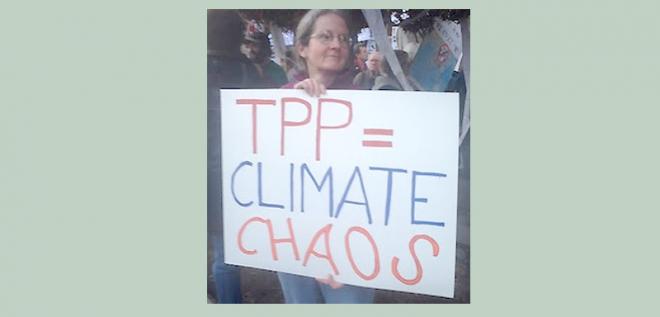What’s ‘real deal’ about Paris climate deal?
Published on January, 02 2016
By Nancy Price
Reporters praised the Paris climate agreement as a “global turn from fossil fuels” and “major leap for mankind.” Oscar Reyes, Institute for Policy Studies, writes that “the main text of the agreement is long on rhetoric and short on action.”
Thanks to Jeri Bodemar of the Santa Cruz Branch who called to my attention to Oscar Reyes’ extremely important and concise critique “Seven Wrinkles in the Paris Climate Deal.” Based this critique, all I can say is…
It is shocking
how far the United States was willing to go
to ensure adoption of a weak, ineffective agreement
in order to protect the global fossil fuel and nuclear energy industry.
It was the huge number and diversity of the global grassroots climate justice and democracy movements mobilized in Paris that made a great difference in at least getting the 1.5 degree C benchmark recognized, holding “The People vs. Exxon Fossil Fuel Cover-Up” and “Rights of Nature” Tribunals, creating artful actions and protests even when these were banned and risking arrest. By converging in Paris, all these groups could solidify their global coordination and mutual commitments for on-going action. You can review Democracy Now’s excellent coverage of the inside and outside events in Paris here.
Below, I briefly summarize Reyes’ points, but first I urge each of you to read his short article and then order our new “CLIMATE JUSTICE+WOMEN+PEACE” Infographic Card that is both downloadable/printable and available in bulk printed quantities for branches and members to order for free, while only paying for shipping. Click here for information on ordering.
Use this Card at every opportunity for education and mobilization, especially during the coming weeks when the national movement to defeat the TransPacific Partnership (TPP) moves into high gear with President Obama’s January 12 State of the Union Address, when he’ll promote the TPP and his expected February 4 New Zealand trip to sign the TPP with other heads of state.
The TPP will be a major driver of global warming and climate chaos.
Carbon pollution from international shipping and flights that will accelerate under the TPP doesn’t count and neither does carbon pollution from the military!
Here, briefly, are Oscar Reyes’ critical points about the Paris Climate Deal.
1. Its targets are ambitious, but they’re unlikely to be met. The agreement promises to “pursue efforts to limit to 1.5 degrees C“ or 2.7 degrees F, which is even more aggressive than the 2-degree C baseline promoted by scientists to prevent the ‘fossil fuels by 2030.
But, this new agreement doesn’t even take effect until 2020, when the chance to achieve the 1.5-degree C goal will have already gone, unless the world’s largest economies drastically change course.
Going into Paris, 176 or the world’s 195 countries stated what they intended to do to address climate change. Even if these promises were met, the world would still be heading for 3 degrees C or more of global warming taking us into dangerous territory, chain reactions and unforeseen “tipping” points from which we and the planet could not - might not recover from.
2. There are no legally binding targets to cut climate pollution. Countries are free to make promises, there’s no penalty if they break them. All they have to do is come back in 2023 and every 5 years to say they’ll do more. This is all promise – no action.
3. No new money is promised to address climate changes in developing countries. By some calculations, already $64 billion is provided and promises in Paris could take it to $94 billion. The estimated need, according to the Climate Fairshares tool is upwards of $400 billion annually!
4. Climate reparations are off limits. The U.S. categorically refused to consider any proposal for reparations for the damage rich countries’ emissions have already caused. The U.S. argued that the Paris agreement should insure wealthy countries against any future claims for “liability or compensation” for the loss or damage caused by climate change (the wealthy countries being historically the largest emitters and drivers of climate change that impacts the poorer countries). This was finally struck from the main agreement, but remains in the accompanying guidance as to how it will be implemented.
5. It doesn’t tell oil, gas, or coal producers to leave fossil fuels in the ground. Avoiding runaway climate change means leaving over 80% of the world’s remaining fossil fuel reserves in the ground. “False solutions” such a bioenergy and carbon capture and storage are promoted, which includes “reforestation,” replacing forests with tree plantations for bioenergy, which actually means kicking indigenous peoples and forest communities off their land for corporations to profit.
6. Opens up same carbon trading loopholes that undermined the Kyoto Protocol. It allowed rich countries to buy “carbon credits,” for example buying tracts of forest, from poorer countries instead of reducing their own emissions.
7. Carbon pollution from international shipping and flights doesn’t count. Emissions from international flights are on course to triple by 2050 and shipping emissions to quadruple, but that pollution doesn’t count as greenhouse gas emissions, according to the Paris Agreement.
Photo: Barbara Clancy at November 16 No TPP March, Washington, DC. Credit: Nancy Price



